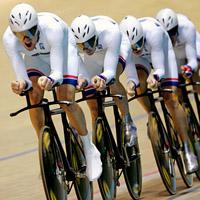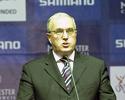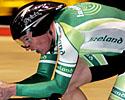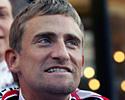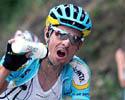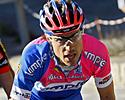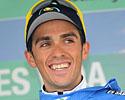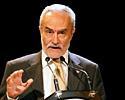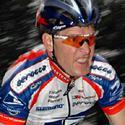First Edition Cycling News, March 28, 2008Edited by Laura Weislo with assistance from Susan Westemeyer Records tumble in Manchester
The competition at the UCI Track World Championships is proving to be some of the fastest in history, with no fewer than four world records being set in the first two days of racing. The home town British riders scored two records on Thursday, setting new marks in the the men's team pursuit and the women's team sprint on their way to three gold medals, with Rebecca Romero adding to the team tally in the women's pursuit. Two world records were recorded in the first day of competition in Manchester, as the French team posted the fastest time in history in the heats of the men's team sprint, only to improve it again in the final with another world record of 43.271 seconds. The record, however, is unofficial because the event relies on laps and not a set distance, and track lengths vary from venue to venue. The other unofficial record went to American Taylor Phinney, who eclipsed the 3'17.775" three kilometre record, which was set by Australian Michael Ford in 2004, during his individual pursuit qualifier. The three kilometre distance is the mark for junior riders, and the 17 year-old Phinney is petitioning to have the time recognised by the UCI, even though it was set during the senior distance of four kilometres. On the second day, the British men's pursuit team smashed the record by nearly three-tenths of a second, going under the time of 3:56.610, set by Australia at the Athens Olympics. Ed Clancy, Bradley Wiggins, Paul Manning and Geraint Thomas put in a 3:56.322 on their way to retaining the World title.
Cyclingnews will cover the 60th edition of
the Dauphiné Libéré live
as of stage 4 on Wednesday, June 10, at approximately 15:00 local Europe
time (CEST)/ 23:00 Australian time (CDT)/ 9:00 (USA East). Fortunately for the riders, the Manchester velodrome was precisely measured by the Plowman Cravens company to ensure the records will stand. The Hertfordshire based geomatics company was asked to measure the new track surface to make it ready to accept claims for world records. The 3D team from the company scanned the track using specialised equipment to create a computer model which accurately measured the 250 metre black datum line marking the edge of the track. Precise measurement is vital to ensure the track complies with UCI requirements. "By using accurate survey methods in the field and then by mapping the surface of the track as a 3D model, we are confident the internal edge of the black line accurately represents the physical 3D distance," said Stuart McLeod, the 3D Project Manager. WADA dumps passport supportTit for tat over Verbruggen/Pound lawsuit could hamper biological passport implementationAdditional reporting from Shane Stokes in Manchester
The World Anti-Doping Agency (WADA) announced that it is withdrawing its support of the new 'Athlete Passport' from the International Cycling Union (UCI) after cycling's governing body sued former WADA president Richard Pound for comments he made about former UCI president Hein Verbruggen during his tenure. Pound was highly critical of Verbruggen and the UCI for not taking stronger action to solve the sport's doping problems. A WADA statement made it clear that this legal action was the basis of its decision. "In light of the UCI's attack on WADA, we now find a partnership with the UCI untenable and will therefore initiate dialogue with other sports in order to advance the Athlete's Passport project," said WADA President John Fahey. UCI president Pat McQuaid responded to Cyclingnews while at the track championships in Manchester. "It is very surprising from our point of view that they should take this view. We haven't done anything against WADA, we have no case against WADA. This is against Dick Pound. We are protecting the position of the UCI against any future liability should his claims be accepted, that the UCI did nothing or did very little in the fight against doping." UCI's passport programme to continueMcQuaid also stated that the organisation would continue its best efforts to implement the biological passport programme, even if WADA withdraws its support. "From our point of view, we are still committed to the biological passport," said McQuaid. "This is a knee-jerk reaction from WADA and I hope that in the coming days with some consideration they might take a slightly different view. "It may take us a bit longer to introduce it now if they are not going to be actively involved in it, but we will press ahead." The biological passports were created as a way to help curtail the use of performance enhancing drugs in the peloton after the 2007 Tour de France was rocked by multiple doping positives. At an anti-doping summit last October, organised by the French ministry of sport, the UCI and WADA came together to hammer out details to ensure the biological passport programme could be put in place quickly to help the sport clean up its image. "WADA agreed to pilot its Athlete's Passport project with the UCI, rather than any other sport, in an attempt to help restore cycling to a cleaner and more credible state," said Fahey. "Since October 2007, WADA has supported the UCI, in financial and human resources, with this pilot project." The passports, which examine the riders' urine and blood samples throughout the season to detect abnormal changes which could indicate doping, is believed to be a more reliable method for catching drug use than traditional anti-doping controls, which look for evidence of the drugs themselves. According to the UCI, the development of the passport model was funded by a WADA research grant. Similar to the programmes of the Damsgaard and ACE programs instituted by teams such as CSC, Slipstream, High Road and BMC, the passport concept has already helped to elevate the images of these squads. However, the UCI's programme has already run into problems with budgetary shortfalls due to the Grand Tour organisers backing out on their commitment to help finance the passports over a separate squabble about the ProTour and its association with the Tour de France. The of the UCI's programme is € 5.3 million for this year alone, according to the UCI, with the haematological profile costing upwards of €3 million per year. The costs were to be shared by the UCI and the ProTour and Professional Continental teams, race organisers, riders, WADA and the French Ministry of Sport. "WADA is only putting in something like $200,000 out of the €5 million budget, so that aspect of it is minimal. The money they were putting in was in the form of manpower because they were paying the salary of one person who was working on the team of the biological passport. Now we will be working with one person less, but we will have to do that," said McQuaid. According to WADA the withdrawal of support for the UCI will not affect the teams' use of its ADAMS whereabouts system. O'Loughlin sixth, Olympic place likelyBy Shane Stokes in Manchester
Irish cycling had a boost on day one of the track world championships in Manchester when David O'Loughlin smashed his national record and finished sixth in the individual pursuit. The 29 year-old made a considerable improvement over his 17th place of twelve months ago, clocking a time of 4 minutes 20.91 seconds and thus going 4.4 seconds quicker than the national record set in December. O'Loughlin's ride saw him almost catch the UCI world number one Phillip Thuaux (Australia) and ensured he finished ahead of several established names, including Volodymyr Dyudya (Ukraine), Dominique Cornu (Belgium), Sergei Escobar (Spain) and last year's silver medallist Robert Bartko (Germany). It is thought that the boost to his world ranking should be enough to qualify him for the Olympic Games, although this will not be confirmed until the UCI updates the standings next week. "I am delighted to do a personal best and to beat it by a considerable way," O'Loughlin said after his race. "There was only one guy ahead of me today who had been higher than me in the world rankings, so that will help things for the Olympic place. The criteria is very confusing and there is some math to work out, but this result is good. "I knew I was in good form beforehand but it is hard to know exactly how it will go on the day. I felt strong today and went fast early on, so I knew I was on a good ride. Going through the two kilometre point I was very comfortable and was banging out the laps consistently, and when I saw the other rider ahead of me at the end that was also a boost. The last kilometre always hurts but I had someone to chase." His rate of improvement is also something which encourages greatly. "I've gone over four seconds quicker than the time I set in the Beijing world cup but I knew that if I could do that in December, then there was a lot more in me when I built form." After several years competing internationally on the road, O'Loughlin took up the individual pursuit in September of 2006. The then-Navigators Insurance rider immediately improved the Irish national record to 4 minutes 29.9, but it was not until the Beijing World Cup last December when he went quicker. His time of 4 minutes 25.31 was encouraging, and so too his placings of seventh, eighth and fourth in the Beijing, Los Angeles and Ballerup World Cups. However his time at this world championships is what will give the greatest boost to his confidence; if his progression continues and he can improve by another second or two, the Team Pezula rider knows that he can head to such competitions with realistic medal ambitions. Team manager Frank Campbell was buoyant after the world championship ride. "As we said last year, it is a learning curve. We changed things, we had good coaching help thanks to the assistance of the [Irish] Sports Council, and we learned by our mistakes. David has now proved that he has got it; we always knew deep down he had the engine to do it, but it was a case of getting that engine tuned and getting it to work on the day." See Cyclingnews' full coverage of the Manchester Track World Championships. Mitsubishi-Jartazi seeks second sponsorLack of race invitations, problems with Vandenbroucke add to the team's woes
The Mitsubishi-Jartazi team will search for an additional secondary sponsor at the end of the season. The team is hoping to elevate its status after the UCI decided to grant the team a 'wild-card' status, which would allow them to compete in ProTour events, long as the team did not start Frank Vandenbroucke. Team manager Patrik Stallaert expressed his frustrations on Thursday, after the team was left off of the ASO's invitations for the upcoming Classics. He has also not heard from Vandenbroucke, who is in Italy. "I assume that he is continuing to work on his condition," Stallaert told the belga. "I haven't heard from him for a while." The controversial Belgian rider had returned to Italy to be near his daughter from his failed second marriage. "I have respect for his family situation, but he is an employee, just like every other rider at the Mitsubishi-Jartazi team. He is paid to work and in his case that means riding races. I hope that we can see him racing again in April. We have shown a lot of patience, but that will end sometime," Stallaert concluded. Another rider is preparing for his first race with the team. Australian Alan Davis, who was signed last week, will make his debut with the Estonian-registered Professional Continental team Saturday in the E3 Prijs Harelbeke. "The administrative paperwork is finally all in order. We can use Allan Davis at last. That will be the case on Saturday," Stallaert said. Stallaert will now have to add finding a new secondary sponsor to his list of tasks for the season. Sportswear producer Jartazi will continue to provide clothing for the team, but Stallaert wishes to find another company which can help his bottom line. "I will go in search of a second sponsor for my team in place of the current one, Jartazi," he said. "Our budget is two million euro right now. With a new sponsor perhaps we can increase that." He said that part of the problem lay with the team's troubles with the UCI. "We invested a lot of money in the team in order to get a UCI wildcard, which would allow us to ride ProTour races. We got the right to do that, as a Professional Continental team, but apparently we can't use Frank Vandenbroucke in any of those races," said Stallaert. "It is a riddle to me as to why, because our rider has a valid license from the UCI. There are other so-called 'doping sinners' who may still race." Stallaert continued, "It is too bad that the ASO decided to keep us out of races such as Liège-Bastogne-Liège and Fléche Wallonne. Those are Belgian races and therefore important advertising for us. It is difficult to make a proposal to a sponsor when you don't know what you can offer. That doesn't work anywhere." He added, "Negotiations with a new sponsor are underway, but not yet concrete." Klöden strikes back
Andreas Klöden of Team Astana is fuming about being named in the German doping investigation. Press reports have said that his former team-mate Patrik Sinkewitz named him as being present on a trip to the Freiburg clinic prior to the 2006 Tour de France where Sinkewitz admitted to blood doping. "From a distance I have followed a discussion in Germany, which I can barely stand. It is shocking, how groundless speculation arises, which puts a burden on individuals and their families," Klöden said on his website. Last week the the independent commission investigating the Freiburg University Clinic and doping at Team Telekom/T-Mobile issued a report, in which Klöden's name appeared in one sentence, "A further bill from March 9, 2000, referred to a medication delivery worth 1000 Deutsche Mark to Frau Bettina Jurkat, the then-girlfriend and now wife of Andreas Klöden." Speculation among the German media and public has equated this with a shipment of doping products. "There were no concrete doping charges made against me," the 32 year-old noted. "But in spite of that, this one sentence was enough to excite the fantasy of many. Did none of them see that the commission's report contained no comment as to what was in the delivery? Or was it just easier not to ask about such facts?" He continued, "Every member of the T-Mobile Team and many other athletes will be able to confirm that in our sports medicine care, packages containing legal medications, vitamins or nutritional supplements were routinely sent to athletes. It was nothing unusual to receive a package from Freiburg. The conclusion that this delivery to me was connected with doping is simply false." Klöden then went on to explain the circumstances of that package. "The truth is that obviously a package was addressed to my wife on March 8, 2000, because from March 4 to 13, I was far away, riding for my team in Paris-Nice – which I just happened to win. Because my wife was working in Berlin at the time, she picked up the package from the post office somewhat later – and so much for comments about 'express delivery' or 'refrigerated medications.' "It is too bad that we cyclists have to put up with this speculation, and that so much of it goes over an acceptable limit. I am also astounded at how casually patient information is publicly misinterpreted. I have asked my attorneys to keep an eye on further developments and to protect my rights." Cunego to race Critérium International
Italian Damiano Cunego will return to competition for this weekend's Critérium International, the two-day, three-stage event which takes place in the Northeastern part of France, the team announced Thursday. The 26 year-old will use the race as a tune-up for the upcoming Ardennes Classic, Liège-Bastogne-Liège before beginning his preparations for the Tour de France. Cunego has been suffering from some health problems since the Volta Valenciana at the end of February, and has been on antibiotics to treat an infection. "Damiano is completing an antibiotic therapy to heal an infection that has been disturbing him for 20 days and that influenced him during Paris-Nice," said team physician Guardascione Carlo. The Lampre rider announced last week that he would skip the Giro d'Italia in favour of the Tour de France. Liège-Bastogne-Liège one-day classic at the end of April before concentrating on his main goal for the season, July's Tour de France. Cunego will be joined by Matteo Bono, Roberto Longo, Mirco Lorenzetto, Mauro Santambrogio and Paolo Tiralongo for the Critérium International. Spanish speculate on Contador-Caisse d'Epargne connectionBy Monika Prell
With Astana as the only ProTour team to be excluded from the Tour de France, all of Spain has been up in arms over the loss of last year's Tour de France winner Alberto Contador's chance to defend his title. According to Diario Vasco, there could be an opportunity for Contador to participate in the ranks of the Caisse d'Epargne team, however the rider has insisted that he will remain loyal to the Astana team and its manager, Johan Bruyneel. The rumours of a switch continued despite the insistence of Caisse d'Epargne director Eusebio Unzué that his team has not approached Contador to ride the Tour, although he admitted that this is a question that "they should ask". According to Unzué, however, it would have to be Astana and Contador who take the initiative in such discussions. Unzué opined that "it is difficult that Contador can not participate in the Tour, because it's always the winner who is setting the priorities. But the organisers don't want to risk any sort of question of their image The Spanish speculation is driven by the fantasy that Contador, as part of a Tour team for Caisse d'Epargne, would make for a powerhouse squad alongside 2006 Tour winner Oscar Pereiro, Alejandro Valverde, David Arroyo and others. Unzué expressed his optimism for the sport over the introduction of the biological passports, but sees some problems on the horizon if the political issues between the UCI and race organisers isn't ironed out quickly. "I see difficulties in resolving the conflict between the UCI and ASO. If we don't react immediately, we will disappear within three years," he warned. According to Unzué, "cycling needs to get all its parts in place. If we could have one or two years without scandals, this would be the best medicine." Cordero warns Astana not to do anything stupid
The Astana team of 2007 Tour de France winner Alberto Contador may have turned its attention to giving the young Spaniard the title in the Vuelta a España after it had been excluded from this year's Tour, but Vuelta director Victor Cordero, has made it clear that if Astana does "anything stupid" it could lose its place in his event. The team's invitation was revoked for last year's event after the doping positives of 2006 Vuelta winner Alexander Vinokourov and third overall Andrey Kashechkin. According to Marca, Cordero was firm in his commitment to maintaining the image of his race, and would hold no qualms about rescinding the Astana team's invitation. "I am not just talking about [doping] positives. I mean anything that undermines the image of cycling or the Vuelta," Cordero said. "Everyone knows our history. Last year we decided to leave out Astana, and four Spaniards had to stay home," he recalled. The Unipublic director did acknowledge the change in the Kazakh team, but expressed the same wait and see attitude as which has been taken by Tour de France organiser ASO, who, not coincidentally, announced earlier this week that it might take minority stake in Unipublic. "It has only been nine months since this team has changed, and I want to emphasize one thing, the only problem with the absence of Astana is Alberto Contador, who deserves all the respect because he will be the future of the cycling world," Cordero concluded. French court recommends three years for SainzThe prosecutor of a Paris Court asked for a three year prison term on Thursday, with at least 18 months served for Bernard Sainz, for trafficking, administration of drugs and the illegal practice of medicine. Nicknamed 'Dr. Mabuse', the former horse breeder was involved in distributing illegal performance enhancing drugs to professional cyclists in the late 1990's. The prosecutor also recommended a four month suspended sentence for attorney Bernard Lavelot, who was accused as an accomplice. Sainz' lawyer, Jean-Louis Pelletier, denounced the recommendation as "disproportionate", comparing it to the ten months sentence handed down to trainer Willy Voet after the Festina affair. A verdict is expected April 11. USA Cycling board gets three new officers
USA Cycling experienced a shift in power Thursday as its Board of Directors elected three new officers at its biannual Board Meeting Wednesday in San Francisco. Previous vice president Mark Abramson took over as president from Jim Ochowicz, who has held that position since 2002. Hall of famer Wayne Stetina was elected as the Board's vice president, while United States Cycling Federation Trustee Jim Patton will serve as secretary. Abramson, a National Collegiate Cycling Association Trustee, is a 1997 graduate of Tufts University in Boston where he began the school's collegiate cycling programme. Throughout the last decade, Abramson has been an integral advisor to collegiate cycling's significant contributions to overall membership growth and athlete talent identification. He also volunteers as the Eastern Collegiate Cycling Conference Director and serves as a race promoter of various events in New England. Stetina, who was a member U.S. Olympic teams in 1972, 76 and 80 is a ten-time national champion is still competitive in the masters categories for the US Postal masters team, and works as a product manager for Shimano. (All rights reserved/Copyright Future Publishing Limited 2008) |

|
January 2009 |
Recently on Cyclingnews.com |

